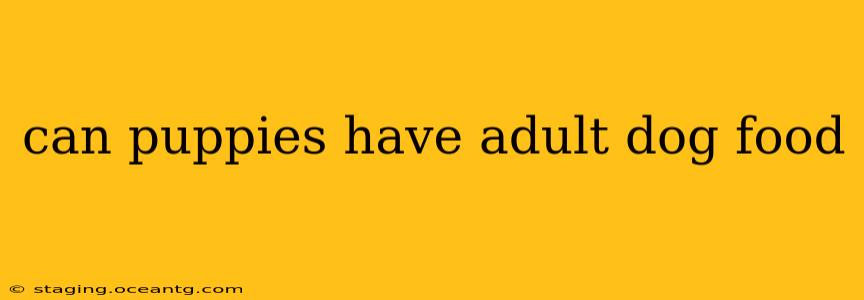The simple answer is no, puppies should not eat adult dog food. While it might seem like a cost-saving measure or a way to simply things, feeding your puppy adult dog food can have serious consequences for their health and development. This article will delve into the reasons why, exploring the nutritional differences and potential problems that arise from this practice.
Why Puppy Food is Different: Nutritional Needs
Puppies are growing at an incredibly rapid rate, requiring a diet significantly different from that of an adult dog. Their nutritional needs are much higher, particularly in terms of:
- Protein: Puppies need a higher protein content to support muscle growth and development. Adult dog food often contains lower protein levels, which can lead to stunted growth and weakness in puppies.
- Fat: Fat is crucial for energy and brain development in puppies. Puppy food usually has a higher fat content than adult food. Insufficient fat can negatively impact their cognitive function and overall health.
- Calcium and Phosphorus: These minerals are vital for strong bones and teeth during the rapid growth phase. Puppy food is carefully formulated to provide the correct calcium-to-phosphorus ratio, crucial for preventing skeletal problems. Adult dog food may not provide these nutrients in the appropriate balance.
- Vitamins and Minerals: Puppies need a broader range of vitamins and minerals to support their developing immune systems and overall well-being. Puppy food is specifically formulated to meet these increased needs.
What Happens if a Puppy Eats Adult Dog Food?
Feeding your puppy adult dog food can lead to several problems, including:
- Stunted Growth: The lack of essential nutrients, particularly protein and calories, can result in your puppy failing to reach its full potential size.
- Weak Bones and Joints: The incorrect balance of calcium and phosphorus can lead to skeletal deformities, such as bowed legs or hip dysplasia.
- Poor Coat and Skin: Nutrient deficiencies can manifest as dull, dry coat, and skin problems.
- Weakened Immune System: A lack of essential vitamins and minerals can make your puppy more susceptible to illnesses.
- Digestive Issues: Adult dog food might be harder for a puppy's digestive system to process, leading to diarrhea, vomiting, or constipation.
Can Puppies Eat Some Adult Dog Food?
Even small amounts of adult dog food can be detrimental to a puppy’s health. It is crucial to stick to puppy food until your veterinarian recommends transitioning to adult food, usually around 12 months of age. This transition should be gradual to prevent digestive upset.
What if My Puppy Accidentally Ate Adult Dog Food?
If your puppy accidentally consumes a small amount of adult dog food, it’s unlikely to cause immediate harm. However, monitor your puppy closely for any signs of digestive upset, such as vomiting, diarrhea, or changes in appetite. If you notice any concerning symptoms, consult your veterinarian immediately.
How to Choose the Right Puppy Food
Choosing the right puppy food is essential for your puppy's health. Look for foods specifically formulated for puppies, indicating the breed size (small, medium, large) if relevant. Read the ingredient list carefully, choosing foods with high-quality protein sources as the primary ingredient. Consult your veterinarian for recommendations on suitable brands and feeding amounts.
Transitioning from Puppy to Adult Food
The transition from puppy food to adult food should be gradual, usually starting around 1 year of age. Consult your vet for guidance on the best approach for your puppy's breed and size. A slow introduction of adult food, mixing it gradually with the puppy food over several days, minimizes the risk of digestive upset.
Remember, your puppy's health depends on proper nutrition. Providing them with the right food is a crucial investment in their long-term well-being. Always consult your veterinarian for personalized dietary advice.
